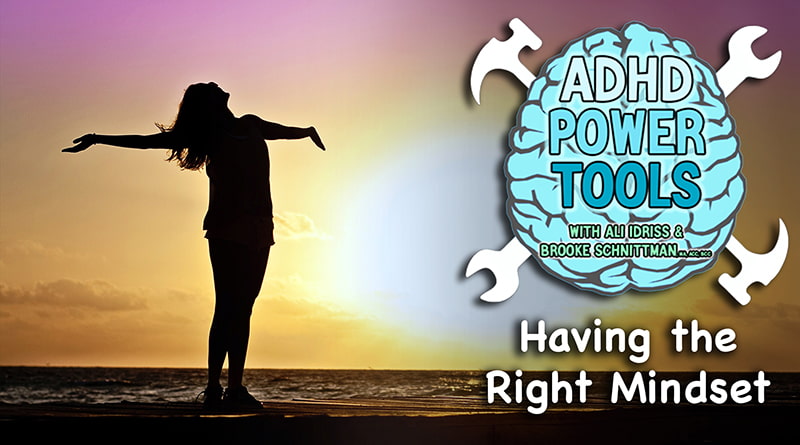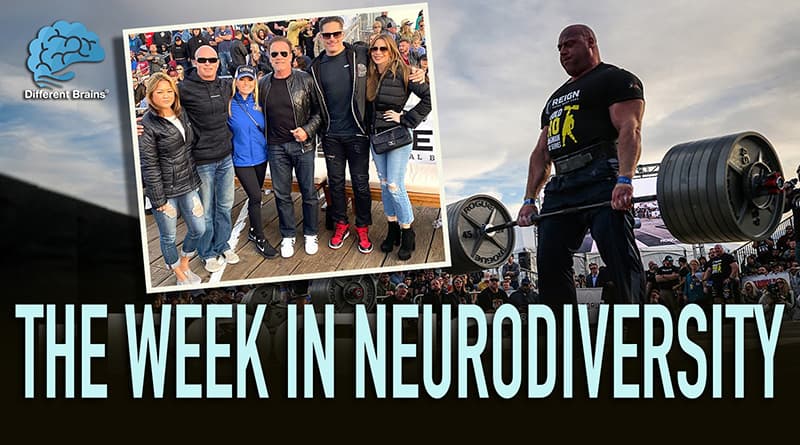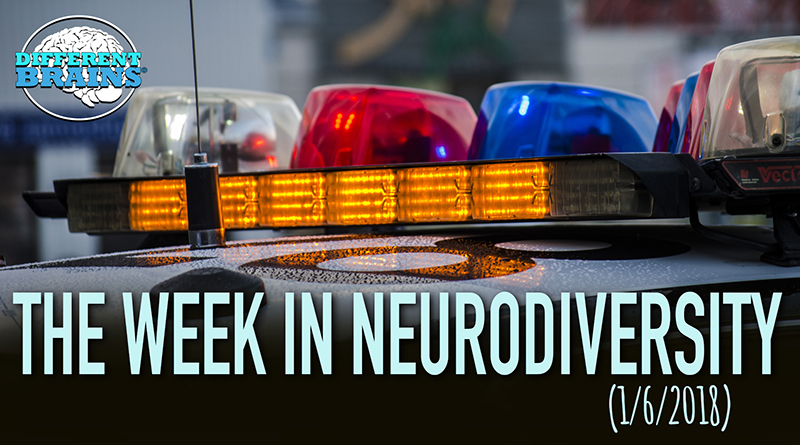2019 in Review: The Wisdom of Self-Advocates, w/ Marcie Ciampi, Haley Moss, Jude Morrow & more | EDB 191
2019 in Review: The Self-Advocates
(14 minutes) In this annual two-part special episode we cover some of the highlights from of Exploring Different Brains in 2019. In this first part, we are going to hear from inspiring self-advocates we have featured: J. David Hall (autism self-advocate and NeuroGuides CEO & founder), Clay Moyle (author and brain injury survivor), William Manzanares IV (entrepreneur, author, and dyslexia self-advocate), Jo Ann Marianne (mental health self-advocate and board member of NAMI Broward), Kayla McKeon (the first Washington lobbyist with Down syndrome), Amy Gravino (certified autism specialist, autism self-advocate & consultant, and columnist), Jude Morrow (autism self-advocate and author of “Why Does Daddy Always Look So Sad?”), Marcie Ciampi, M.Ed. (autism self-advocate, author, and educator), and Haley Moss (author, self-advocate, host of Spectrumly Speaking, and the first openly-autistic lawyer in Florida).
For more about the guests featured and their full interviews:
J. David Hall: NeuroGuides.org For his full interviews, click here and here
Clay Moyle: PrizeFightingBooks.com For his full interview, click here
William Manzanares IV: WillTalksBiz.com For his full interview, click here
Jo Ann Marianne: NAMIBroward.org For her full interview, click here
Kayla McKeon: KaylaMcKeon.com For her full interview, click here
Amy Gravino: AmyGravino.com For her full interview, click here
Jude Morrow: JudeMorrow.com For his full interview, click here
Marcie Ciampi, M.Ed: MySpectrumSuite.com For her full interviews, click here and here
Haley Moss: HaleyMossArt.com For her full interview, click here
AUDIO PODCAST VERSION:
Or look for us on your favorite podcast provider:
iTunes | Stitcher | SoundCloud
FULL TRANSCRIPTION
The Wisdom of Self-Advocates
HACKIE REITMAN (HR): Hi, I’m Dr. Hackie Reitman. Welcome to this special two-part episode covering just some of the highlights from Exploring Different Brains in 2019. In this first part, we are going to hear from a handful of the inspiring self-advocates whom we have featured.
DAVID HALL
DH: If you look back at the history of the word for autism, the original pioneers, the diagnosticians, the people of the researchers, who studied this thing we call autism, you know we’re fairly recent with this, Hackie, I mean you know that even 30 to 40 years ago, this was almost unknown- I mean known by a very few people, but it wasn’t until, you know, until Dustin Hoffman stepped onto the big screen with ‘Rain Man’ and began to talk about this thing- this thing called autism, and so what happened is that it jumped onto the cultural stage and it jumped onto the stage in a very strange way. Because Dustin Hoffman played- let’s give him credit for playing an autistic person, and he studied the role, and Steve Silverman knows him and- he did a good job playing for what he did, but also he communicated a picture, an image of an autistic person, that the culture picked up and ran with. So your question is what -what is the one thing that’s just -that we just get wrong as a culture? And I would say it would be making assumptions that all autistic persons are the same, and that- that they don’t each have unique attributes, this is a huge problem, it affects everything we do in the in the job market, educationally, it affects everything -it’s pervasive. If we can change one thing, if – and I- this is something I labor to do- if I could change one thing, it would be to show and to showcase and demonstrate that autistic persons, that it is a very big spectrum, and autistic persons are all each one unique…
CLAY MOYLE
CM: I guess the biggest message or suggestion I would have in terms of suffering a brain injury or head injury is that there is a tremendous amount of information available to us online these days. It’s all at our fingertips, and I would encourage folks to get out there and get multiple opinions. Like I said, had I just gone to this local university neurology clinic and just followed their instructions, I would just be waiting and waiting. Their only recommendation was, “Rest and give it more time.” Some of the most beneficial things that I did to facilitate in my own recovery were things that I never heard about from a neurologist or my doctor, you know, things like functional neurology… Those are things that I learned about online or through talking to other individuals who had successfully recovered from their own head injuries.
WILLIAM MANZANARES IV
WM: One thing I really want to think that’s important to why the ability reading can unlock different parts of the brain, even if you’re a dyslexic brain or whatever brain, is when I was looking through my- I love history enough to really just pay attention to it, and I noticed the greatest leaders in history were all readers, and I believe that everyone should be reading, despite any disadvantage they have, and there’s so many workarounds with today’s technologies, that you can read- listening to audiobooks is reading, and anyone who ever debated me on that, I said you want to talk to my friend who’s a blind- legally blind copy-editor, she reads three books a week through audio. so yeah, that’s my work around with that one; but reading can unlock more, and if a guy who identified like myself- who identified if you identify with not being able to read or I can’t read, your right. But find a way around it. Find a work around and start reading, because it changes something in your brain when you can unlock more and more books. I’m a different person than I was five years ago, I completely changed, and became a positive version of myself- the version I wanted to be through a lot of reading; I want listeners to pick up a book, and it- it- what really frustrates me the most is I struggled my whole life to become a reader, and those who can read without a problem, never had a problem reading, haven’t picked up a book in a long time. I would hope people could pick up a book and just start reading to help understand the joy, the feeling that I feel; I want others to feel that, even if you have identified not being able to read. That’s where I really want to leave any listeners pick up a book.
JO ANN MARIANNE
HR: To those in our Different Brains audience who may have some anxiety and some depression, what advice might you have for them?
JM: You know, the self-recognition sometimes is not that easy, speaking from the heart. Not from being a proud person, although that is a lot of people – it’s pride – but being able to self-recognize is a challenge. You know, it took for me a psychiatrist to diagnose that I wasn’t what I was experiencing. If something feels abnormal, in any case, especially in mental health, it’s always better to seek a professional. And when I went through my experience, which is what I called my explosion day, I was working both with a psychiatrist and a psychologist – I used to call this my A-team. Bottom line, don’t you want to feel your best? And that’s why I think you pursue help, so you can have the best day every day.
KAYLA MCKEON
HR: What is one great misconception about Down syndrome that you’d like to tell our audience that they might have the wrong idea about.
KM: Well, there’s just one, I’m just kidding! But the biggest one would be that we are not capable of doing anything; but you don’t have to look far, because people with Down Syndrome are doing the same thing as everyone else. Did you see that young lady golfer that was able to make it past a sand trap? That had to be difficult; and- or John Cronin from John’s crazy socks, he owns a multi-million dollar company with his dad, and he’s a multi-millionaire! And we are holding down everyday jobs, and we are ready and willing and able to walk and have a career because we can drive a car, we can go to college, and we don’t want to be paid pennies to do the same job as somebody else. We are living proof of that.
AMY GRAVINO
HR: Tell us what advice you have for parents of a young female autistic spectrum individual.
AG: Well, I get questions asked to me a lot by parents of those girls, and when I see these girls, because I see them at the conferences or I see them in other environments, I see myself in them a lot, and I just want to protect them and, you know, keep the world from hurting them because I know what’s out there and what’s waiting for them, but I also know that if you put somebody in a bubble to ensure that nothing will ever happen to them, nothing will ever happen to them. That’s not how you survive in this world. You do not survive by having no skills and having no knowledge of what the world is really like, so I would tell people, “My parents did the most important thing, which was they let me go off and get my heart broken.” Obviously, they didn’t want to see that happen to me. Obviously, it must have been, you know… the day after I lost my virginity, I called my mother and told her. Like, I’m sure that’s not a phone call she thought that she was ever going to get from 3,000 miles away, but that’s how close that we had become that I was able to confide in her and tell her that, and so when I got my heart broken and all those terrible things happened, obviously it was devastating. No parent wants to see their child in pain, but you can’t learn from mistakes if you don’t make them…
JUDE MORROW
JM: Whenever I was assigned in books up at the start of the end of the book journey, I had been doing personalized inscriptions and one of my favorite inscription sets for a small non-verbal Child Called Kayla and I thought I really want to write them inscription that might give hope and what I wrote on the book was, you know for Kayla, sit back and listen and one day you will sing. and that may happen. you know, listening is a good thing as well, And of course I didn’t do much of that myself, I’m almost not a great father of my own advice sometimes. but you know with patience and love and kindness and determination, we can get there eventually and I know maybe not every child will have a success story like mine but knowing that life is precious and there is a lot more help and support out there and nobody nobody is alone on this journey… There’s so much out there that can help and support parents and play to their strengths mine was reading, I read prolifically and wrote prolifically even as a child. I was nurtured on me. I wasn’t expected to be fit in with a crowd or become like other children my age trying to become like other children my age was actually a lot more toxic than being myself and expressing myself the way I should have, instead of what other people expect of me to.
MARCIE CIAMPI, M.ED
MC: What I teach about is first of all, finding out what autism means to you as an individual. What is Asperger’s, what is Autism, what -how are you going to identify in this world? So what would that mean? That would mean looking for tools, going to books written by actual autistics, blogs written by autistics, YouTube, your type of media that you put out there into the world that helps going to those resources and really understanding what autism is about. When I was explaining it to the gentleman yesterday, I was explaining that for me, and I hope this isn’t offensive, but the way I like to look at it is if someone adopted an individual from a different culture, let’s say a black child. You would still want to immerse them if you were Caucasian, you still want to immerse them in their history and their Heroes, and in their culture, and what is happening with neurotypical or non-autistic parents that have autistic children, is I think sometimes you’re missing the aspect that autism is not only a diagnosis, but it’s also an identity and a culture.
HALEY MOSS
HM: I think the biggest piece of advice I’d like to give, is first, be proud of who you are, there’s nothing bad about being autistic. I mean, it’s not always easy, I’m not here to say that your road is going to be sunshine and roses, but I do want to say that you have a very unique perspective of how you see the world, and- it’s beautiful, nobody can take that away from you. That being said, you all, so unlike a lot of other people, are probably incredibly self aware. So you probably know your strengths and weaknesses better than anyone else, and in that case, I’d say explore your talents, know what makes you who you are, and embrace it.




